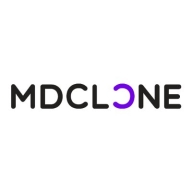

MDClone is used for accessing and analyzing healthcare data, generating synthetic data for research, and sharing information securely. It supports clinical operations by creating realistic patient data, driving efficiency in research, and improving health outcomes.
MDClone aids healthcare institutions in optimizing data-driven decision-making processes. It facilitates cohort creation, streamlines data exploration, and provides robust analytics. Its synthetic data generation ensures patient privacy while offering realistic datasets for research and clinical operations. Users find it highly versatile in handling large data volumes and appreciate its intuitive design despite some challenges with performance and setup complexity.
What are MDClone's most important features?In healthcare, MDClone is implemented to foster innovation by enabling safe data sharing and enhancing research capabilities. Clinical researchers leverage its synthetic data for studies while ensuring patient privacy. Institutions aiming to improve health outcomes utilize its robust analytics for better decision-making, driving efficiency and innovation in delivering care.
Synthesized SDK is utilized for generating synthetic data to enhance testing and analytics, ensuring data privacy and compliance and improving algorithm training and validation in machine learning models.
Frequently leveraged for creating anonymized datasets that mimic real-world environments, Synthesized SDK aids in data transformation and streamlining data workflows. Users often highlight its efficiency in handling large datasets and its ability to elevate project precision by mimicking real-world scenarios. The SDK is known for its ease of use, high-quality data creation, and extensive API support. While appreciated for its capabilities, some users note challenges due to non-comprehensive documentation, unclear error messages, and limited customization options.
What are the key features?In industries such as finance, healthcare, and retail, Synthesized SDK is implemented to address specific needs for synthetic data generation. Financial institutions use it to create anonymized customer data for secure analysis, ensuring compliance with data protection regulations. In healthcare, it generates synthetic patient data for research purposes while maintaining patient privacy. Retail companies leverage the SDK to analyze consumer behavior and improve recommendations without compromising customer information. Although it streamlines data workflows and enhances data handling efficiency, users in these industries often seek more comprehensive documentation, clearer error messages, and specific tools to better utilize its features.
We monitor all AI Synthetic Data reviews to prevent fraudulent reviews and keep review quality high. We do not post reviews by company employees or direct competitors. We validate each review for authenticity via cross-reference with LinkedIn, and personal follow-up with the reviewer when necessary.